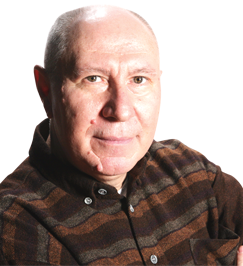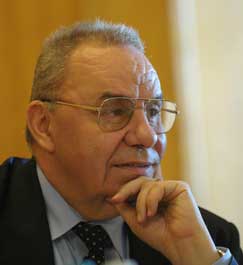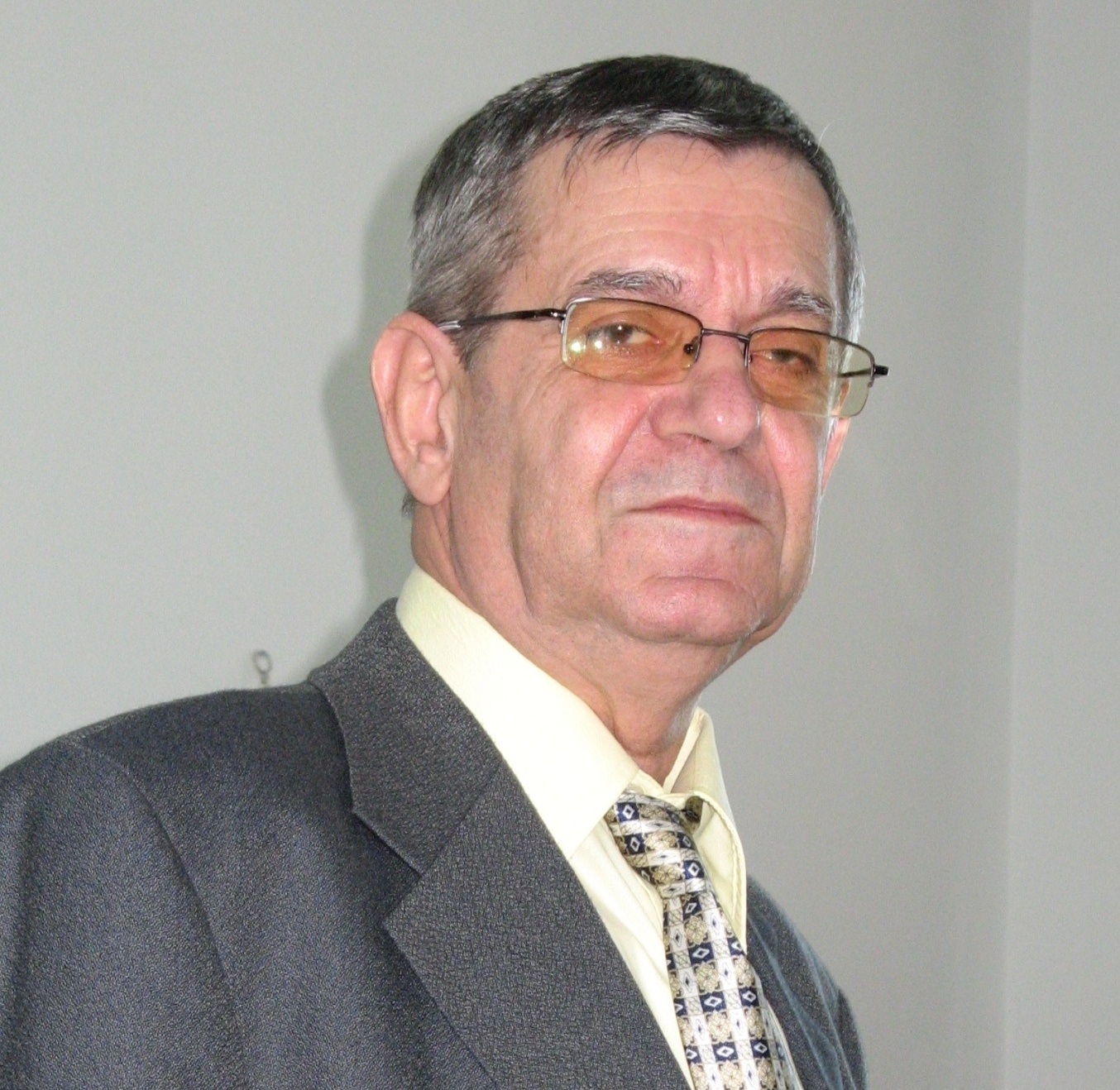Mihai-Razvan Ungureanu believes Romania should have an European diplomacy, without any clich...s or "stars on the shoulders", like before 1989. How much is true and how much is surreal in these targets? You will find the answer in the next interview, which took place a few days after the annual reunion of the Romanian diplomacy.
He is one of the youngest European External Affairs Ministers, but not the youngest. His youth and his erudition, especially, are the secrets of his success in the foreign countries. He is serious and his British style doesnât make him a very popular person at home. However, an average person would certainly say he has a good opinion about Minister Ungureanu. Thatâs because he seems to work a lot and not to prefer any sorts of compromises. We talked openly about the external politics of the 2005 Romania and found about his ambitions and limits.Jurnalul National: Are you more optimistic or more concerned after the reunion of the Romanian diplomats? I am referring to the message sent, including here the one of the President. Did they get the meaning of it?
We expected such messages. After these past eight months, I donât think there is any doubt about the intentions regarding the external politics from the Executiveâs point of view or from the Ministryâs point of view. The contacts have been very often, a lot of fronts in the external politics have been initiated and therefore, the results are convincing for the type of activity we have. It is natural for us to demand a certain diplomatic conduct for this amount of work. Of course, we have to consider the present geo-political situation of Romania, which is very different from the External Affairsâ portfolio five years ago.
The understanding of this new geo-political identity actually brings this opportunity: a state member of the NATO, a state member-to-be of the EU, a state with great responsibilities. Thanks to the neighbors or thanks to its representative presence in the architecture of important External Politics: the Security Council, the European Council or the Black Sea Economical Cooperation Organization, for this autumn only.
A state that takes this kind of responsibilities cannot block his external strategy. On the contrary, it shows a pregnantly participative tone when it presents its interests.
OK. This was the message. What about the way it was received?
The results will show the way in which the message was received. There is also an inventory of the priorities. The President, the Prime Minister and I referred to it and it will certainly be a criterion for evaluating the diplomatic efficiency. The priorities are not optional. We will see the impact of these messages, which are also strategic indications, as well as the methodology of reaching the strategic targets. This wasnât propaganda. We asked a new kind of political conduct. This was a work meeting. I didnât see it as a balance of the diplomatic activity, but as a start in a time trial at the end of which we should find the crucial objectives.
NO MORE CLICH...S!
You had the opportunity of looking into the room where the reunion took place. How many of the faces that represent us abroad are still appropriate for this mission?
Each personal biography counts, but not the faces. I have to say that the diplomatic performances appear rarely in early ages of our lives. The sedimentation of the social and political experiences, apart from the job commitment, is what brings the diplomats to performances. I am only saying this because I donât the people think that age is an obstacle. On the contrary, the requirements are maximum at full maturity. These are the professional exigencies. However, I believe that after 15 years of looking for the model of diplomatic representation, our projection shouldnât get further than the offer of the European diplomacy. It is represented by the pro that has equally social surface and intellectual ability, that is creative, with no clich...s, that is prompt and tactful as well. How many of the diplomats have these qualities? I am sure that not all of them. It is not a secret that the diplomatic and consular representatives donât meet all our expectations. Actually, I mean the expectations of the Romanian taxpayer, and not the political elite! My argument for this answer is the fact that Romaniaâs ambassadors and general consuls suffer from successive changes. On one hand, it grows young again, on the other hand, it encourages the professional activity or invests in the academic intelligence.
PEOPLE, DESTINIES, CHANGES
You promised a reform of the Ministry and you have already started it. Why is it so hard to replace some ambassadors and to pension others, which should be pensioned?
I wouldnât like the people to understand that the reform means then brutal elimination of a generation, circumstantial Jacobinism political purification. The reform of a such delicate Ministry like the Ministry of External Affairs, which lives in two worlds, in Romania and abroad, is successful only if the institutionâs organization doesnât suffer from the renewal efforts. The risk of a surgery without anesthetics on MEA is enormous and might have incomputable strategic consequences. The reform starts from the reinitiating of several internal mechanisms of administration of the personnel strategy, like pensioning, the competition for receiving the diplomatic degree or the one for leaving abroad to work. These mechanisms have been blocked in the past from various reasons. As for the pensioning, as well as for the withdrawals, there are some time intervals, which have direct influence on the quickness of this kind of processes. There is a time interval of 100 days between the retirement decision and the obtaining of the decision from the authorities. This is the same in the case of the recalling: the respective person has three months to end his mission with dignity. We are interested in making this reform work and we donât want to make a wreck out of the ministry. And we have to take into account the destinies of the employees as well, which is very important. I cannot afford playing with the lives of the MEA employees, no matter their ages! I want to make the functioning of these mechanisms seem normal, but not exotic in any way. This ministry is one of the youngest of the Romanian Executive: more than 50% of the personnel are aged less than 40. Approximately 75% of the people are yet to be 50 years old. They will lead the departments of the Ministry and will represent Romania abroad. However, being an ambassador is always related to the age.
YOUTH RECORDS
What is the minimum age for becoming an ambassador?
There is no threshold, but there are records. For example, the new Romanian ambassador in Ukraine is 35 years old. The Ambassador Lady in Croatia is 36 years old, Toader Paleologu, the ambassador-to-be in Copenhagen, is 32, our ambassador in Poland in 35.
What are the criterions for becoming an employee of the MEA nowadays? What is the field that is preferable for the candidates to come from?
A commission, led by a state secretary makes the examination criterions. The Ministry is very short of linguistic competition for neo-Slavonian languages, including Russian. There is a deficit for the German speakers that we are about to cover, but there are less and less French speakers and we need people who speak less known languages. They are in the Ministry, but they are not enough. They will probably be privileged by the commission. We are more and more sensitive because of the few people having studied social sciences, and we will privilege the candidates with post-graduate studies in an international-politics-related field: social and political studies, economical international relations, economy. However, it is obvious that a good knowledge is required and attentively checked
PEOPLE AND STRUCTURES
Speaking of foreign languages. Do we still have any ambassadors that donât speak any foreign language?
I hope not. I can assure you that, if something like that happened, it would be corrected immediately.
You know they say you should have "a few stars on the shoulder" to get to be a diplomat. What do you think is the source of this?
Well, do I have any stars? My secretaries donât have any eitherâ¦
Letâs talk strictly about Romaniaâs representatives.
It isnât true. In 2005, the diplomacy is diplomacy in Romania. A European diplomacy. Period. The Embassies are not the spiesâ headquarters. This is the belief before 1989, but the embassy is an embassy, and the Romanian diplomacy is European!
You have promised and you work on a "White Book" with the results of the eight months of your mandate. Why after eight months?
Simply because this is when the reunion of the ambassadors took place. We considered the reunion as the opportunity for a review of the first part of the activity, an excellent opportunity for a sincere analysis of the things we did with the short-period projects, the things we were able to generate and the things we werenât able to do. The "White Book" has three chapters: the projects from the taking over of the mandate, the things we managed to accomplish and the things that are next. There is a natural need for evaluation. This is like a mirror of our capacity in six months, because two months were holiday. This is not a document to emphasize triumphs, but a check rod of the operational and planning capacity of the MEA. In parallel to the "White Book", the thematic strategies for external politics have been made. This is the first time they are made this way. There were some other tries, last year, but that document was very theoretical. It also didnât answer to all the essential questions: who are we where do we go, what are we capable of, what are our resources. I am not pleased with an excessive degree of generality in my work. But, as a challenge of concentration, it was welcome. This time, it is about the systematic analysis of MEA. The text also talks about our directions in the external politics. The press will also receive a short form of the "White Book" and you will see the things I was talking about.
It looks very good on paper, we are waiting to see it in reality!
It has started to happen already, it has already started to workâ¦
OK. This happens at the MEA, but what about the rest?
Give me a good internal politics and you will have a good external politics!
COMPUTATION FOR 2007
What are we going to do, because we have only plans "A" and no plans "B"? Do you really believe in the chance of the adherence on the 1st of January 2007?
I believe in 2007. I believe in our capacity of being present at the meeting in January 2007. I cannot make any predictions. The only thing I can say now is that, for now, Romania is where it should be, and the evidence makes me hope so. However, it is clear that European Commission as well as the representatives of the member states emphasize the fact that everything is up to us, every time they get the chance.
SLOGAN OR REALITY
We also know this, but we cannot go further!
I cannot believe this. We are on schedule and I hope we will manage to do it. There is something more: the fact that we ask about the things that are going to happen and the answer "what you wish to happen" suggests that, after all, the result is exclusively determined by our internal performance, not by political incidents external to us. The European Union needs Romaniaâs success, because this success motivates once again the political validity of the integration process
A few years ago, President Ion Iliescu was saying that Serbia and the Black Sea are the only true friends of Romania. The sea is the sea. What about the neighbors?
What about the neighbors? I say we are in a comfortable situation. First, because we are a part of the two clubs that produce, we have prosperity as well as security, so we cannot think in the terms of the defenders of an under siege fortress. We are not alone. We are a country with allies that sets its interests in accordance to its allies. This way, we are in the same club as Hungary and Bulgaria. As for Ukraine, we have great expectancies and we said this at the official meetings. We have the same expectations as the ones of a European country from a country with European destiny. We want to respect the rights of the Romanian communities and we have expectations, naturally. We believe in the ability of transforming, modernizing the reform in Ukraine, as well as in Serbia. The European and Transatlantic projects have an extraordinary transformational capacity, they generate modernity. The advantage of following a pro-European, a pro-Euro Atlantic strategy is immediate.
If these orientations are visible and, I hope, definite in Ukraine and Serbia, then I donât see any problems. The Moldavian Republic is in the same situation.
There were times when we bragged ourselves with being great players of the international politics. Where are we standing now?
I believe we apply an extremely decent external strategy, a strategy destined to meet our interests and the interests of our allies. In external politics, there is no need for great epithets or for excess of linguistic expressivity. For me, external affairs have a quality seen in the quickness with which we reach our goals. Our external strategy must be European and Euro Atlantic. We are not competitors in a beauty contest! Europe is the leader of this process.









